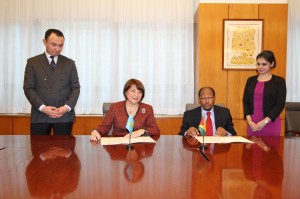Guyana and Kazakhstan last week, formally established diplomatic relations during at a ceremony in New York.
The communiqué establishing diplomatic relations was signed at the Permanent Mission of the Republic of Kazakhstan by Guyana’s permanent representative to the United Nations, Ambassador George Talbot and the permanent representative of Kazakhstan, Ambassador Byrganym Aitimova.
The two countries expressed their confidence that the establishment of diplomatic relations will contribute to the promotion of trade, culture, and friendship.
Guyana and Kazakhstan have in the past cooperated in several multilateral fora such as the United Nations and the Organisation of Islamic Cooperation, on issues of common interest.
This marks another step in the strengthening of relations between the two countries, and is expected to lead to enhanced bilateral cooperation, the Foreign Affairs Ministry said in a release.
The decision is in keeping with the foreign policy of the government of Guyana, to develop relations with as many member states of the international community as possible, with which it has mutual interests.
Vast mineral resources

- Guyana’s permanent representative to the United Nations, Ambassador George Talbot and the Kazakhstan permanent representative, Ambassador Byrganym Aitimova pose for the cameras after the signing ceremony while their representatives look on



